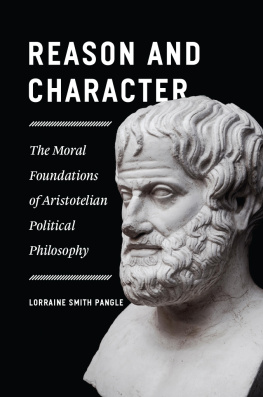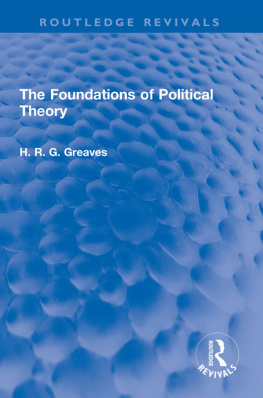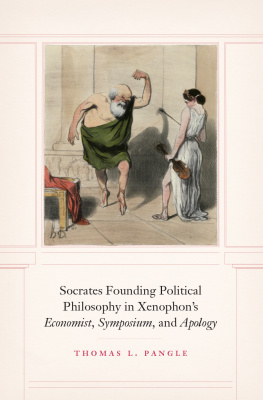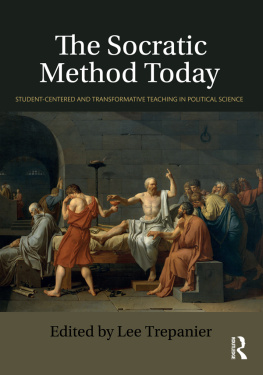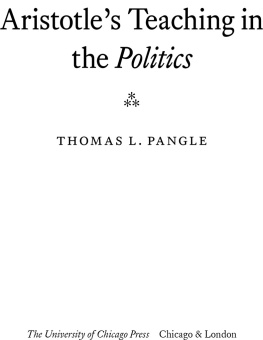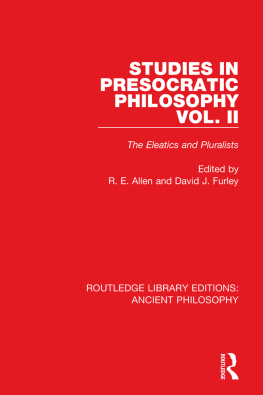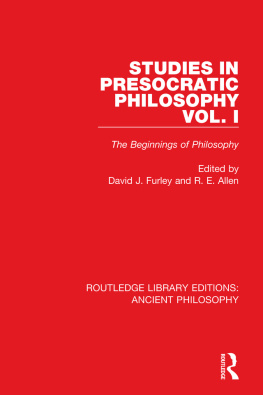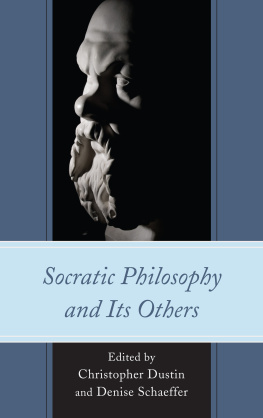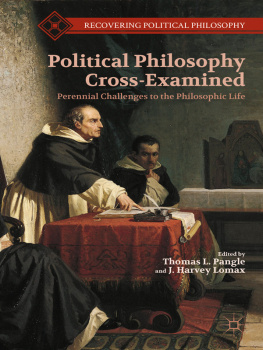Lorraine Smith Pangle - Virtue Is Knowledge: The Moral Foundations of Socratic Political Philosophy
Here you can read online Lorraine Smith Pangle - Virtue Is Knowledge: The Moral Foundations of Socratic Political Philosophy full text of the book (entire story) in english for free. Download pdf and epub, get meaning, cover and reviews about this ebook. City: Chicago, year: 2014, publisher: University of Chicago Press, genre: Science. Description of the work, (preface) as well as reviews are available. Best literature library LitArk.com created for fans of good reading and offers a wide selection of genres:
Romance novel
Science fiction
Adventure
Detective
Science
History
Home and family
Prose
Art
Politics
Computer
Non-fiction
Religion
Business
Children
Humor
Choose a favorite category and find really read worthwhile books. Enjoy immersion in the world of imagination, feel the emotions of the characters or learn something new for yourself, make an fascinating discovery.

- Book:Virtue Is Knowledge: The Moral Foundations of Socratic Political Philosophy
- Author:
- Publisher:University of Chicago Press
- Genre:
- Year:2014
- City:Chicago
- Rating:3 / 5
- Favourites:Add to favourites
- Your mark:
- 60
- 1
- 2
- 3
- 4
- 5
Virtue Is Knowledge: The Moral Foundations of Socratic Political Philosophy: summary, description and annotation
We offer to read an annotation, description, summary or preface (depends on what the author of the book "Virtue Is Knowledge: The Moral Foundations of Socratic Political Philosophy" wrote himself). If you haven't found the necessary information about the book — write in the comments, we will try to find it.
Virtue Is Knowledge: The Moral Foundations of Socratic Political Philosophy — read online for free the complete book (whole text) full work
Below is the text of the book, divided by pages. System saving the place of the last page read, allows you to conveniently read the book "Virtue Is Knowledge: The Moral Foundations of Socratic Political Philosophy" online for free, without having to search again every time where you left off. Put a bookmark, and you can go to the page where you finished reading at any time.
Font size:
Interval:
Bookmark:
Virtue Is Knowledge
The Moral Foundations of Socratic Political Philosophy
LORRAINE SMITH PANGLE
The University of Chicago Press
Chicago and London
Lorraine Smith Pangle is professor of government at the University of Texas at Austin, where she is also codirector of the Thomas Jefferson Center for the Study of Core Texts and Ideas. She is the author of three books, including, most recently, The Political Philosophy of Benjamin Franklin.
The University of Chicago Press, Chicago 60637
The University of Chicago Press, Ltd., London
2014 by The University of Chicago
All rights reserved. Published 2014.
Printed in the United States of America
23 22 21 20 19 18 17 16 15 14 1 2 3 4 5
ISBN-13: 978-0-226-13654-7 (cloth)
ISBN-13: 978-0-226-13668-4 (e-book)
DOI: 10.7208/chicago/9780226136684.001.0001
Library of Congress Cataloging-in-Publication Data
Pangle, Lorraine Smith, author.
Virtue is knowledge : the moral foundations of Socratic political philosophy / Lorraine Smith Pangle.
pages cm
Includes bibliographical references and index.
ISBN 978-0-226-13654-7 (cloth : alk. paper)ISBN 978-0-226-13668-4 (e-book) 1. SocratesPolitical and social views. 2. Plato. I. Title.
B317.P33 2014
184dc23
2013040560
 This paper meets the requirements of ANSI/NISO Z39.48-1992 (Permanence of Paper).
This paper meets the requirements of ANSI/NISO Z39.48-1992 (Permanence of Paper).
For Heather
CONTENTS
ACKNOWLEDGMENTS
Work on this book was supported by fellowships from the United States National Endowment for the Humanities, the Social Sciences and Humanities Research Council of Canada, and the University of Texas College of Liberal Arts. A version of on The Laws was published as Moral and Criminal Responsibility in Platos Laws, American Political Science Review, 103:3 (August 2009), 45673. For helpful comments on earlier drafts of the manuscript or of particular chapters, I am indebted to Peter Ahrensdorf, Timothy Burns, Susan Collins, Ariel Helfer, Thomas Pangle, Christina Tarnapoulsky, Aristide Tessitore, and several anonymous reviewers for the APSR and University of Chicago Press. Publication costs were defrayed in part by a generous subvention grant from the University of Texas.
INTRODUCTION
This book is a study of the moral foundations of Platos political philosophy, pursued through an examination of his provocative claims about the relation of virtue to knowledge. Maintaining that the political art is the art whose business it is to care for souls, Plato returns incessantly to the most fundamental of political questions, classically understood: What is the excellence or virtue of the human soul? Is it in our power to attain it? Is it teachable? What is the root cause of moral failing, and what is the just response to it? His apparent answers to these questions are as familiar as they are strange: virtue is knowledge; all virtue is ultimately one; anyone who grasps the goodness of virtue will choose to do what is just and will prefer to suffer rather than do injustice; vice is due to ignorance; the correct response to wrongdoing is education and not retributive punishmentand yet, despite all this, virtue may not be teachable after all. This book will trace Socrates arguments for these claims and problems in the five dialogues that explore them most thoroughly, the Apology, the Gorgias, the Protagoras, the Meno, and the Laws, giving central attention to his arguments about the relation of virtue to knowledge. The claim that virtue is nothing but knowledge is paradoxical in the most radical sense, for not only does ordinary intuition tell us that we are free to follow or not follow the knowledge that we have, but intuition suggests that to the extent that we are imperfectly free, it is not ignorance but passion that constrains us and leads us astray. Despite the strangeness of this and all Socrates paradoxes, it will be the contention of this book that there is a serious truth at the core of each of them, and especially at the core of his claim for knowledge, that has not been adequately appreciated.
In many ways the claim that virtue is knowledge is clearly rhetorical. Throughout Socrates life, by making the claim in a simple and extreme form, he was able to present himself as a high-minded if nave philosopher whose criticisms of the justice of all human law codes were both well-intended and politically so unrealistic as to be harmless. Thus he managed to protect himself even while giving potential students a glimpse of the radically unconventional nerve of his thought. At his trial in Platos Apology, Socrates uses the claim to show the irrationality of punishing him, to portray himself as a moral hero who alone understands that virtue is the one thing that matters and who adheres to it more steadily even than Achilles, at great cost to himself, and to argue for his inestimable value to the city in his quest to find and to teach others the knowledge they all need in order to be good.
At a deeper level, the claim that virtue is knowledge works as a diagnostic and educational tool. Often, by appearing to take an excessively calculating view of virtue, Socrates succeeds in evoking the passionate resistance of even his most cynically hard-boiled interlocutors, thereby bringing to the surface for examination their commitments to a view of virtue that is nobly uncalculating, unselfish, and even unconstrained by what reason shows us to be good. In this way Platos Socrates proceeds in dialogue after dialogue to show his interlocutors and all of us that our moral thought is both more deep-seated than we may think and also deeply confused. For his analyses implicitly argue that not only his Greek contemporaries but human beings everywhere are beset by a radical confusion about moral responsibility that is rooted in self-contradictory thoughts about the goodness of virtue. As we begin to examine our own opinions about virtue and moral responsibility under Platos guidance, we see that Socrates claims are misleading when taken at face value and yet turn out to have a strange power that is difficult to dismiss. Somehow virtue is indeed all about grasping clearly what is good and why it is good, and somehow this grasp, when truly solid, is efficacious. Somehow the unjust soul truly is unhealthy in a way that no one could wish to be and that calls more for compassion than for vengeance. Grappling with the claim that virtue is knowledge, then, is a first step towards clarity, inasmuch as it reveals the diverse and contradictory opinions that we thoughtlessly hold.
Third and finally, the Socratic paradoxes are an important part of Socrates project of testing his own hypotheses about the inescapable power of the good as we perceive it in governing human choice, as well as about the character of the moral opinion underlying all law both human and divine. Compelling people to grapple with the strong claims he makes for knowledge of the good and to feel their force within their own souls helps him confirm his hypotheses about the structure of moral opinion and about the most important elements in it. In particular, he reveals again and again the copresence of beliefs that virtue is the greatest of goods and that virtue is at bottom a transcendence or sacrifice of what is good, and the difficulty of jettisoning either of these beliefs. It is an important part of Socrates Delphic quest for wisdom to see how his companions change their views as a result of their encounter with his strange claims and with their own ambivalences and to see what else changes in them as their opinions evolve.
In order to unpack the most serious layers of Socratic argumentation, my method will be to proceed by means of a careful, systematic textual exegesis of the five dialogues, approaching each as a whole. For the
Next pageFont size:
Interval:
Bookmark:
Similar books «Virtue Is Knowledge: The Moral Foundations of Socratic Political Philosophy»
Look at similar books to Virtue Is Knowledge: The Moral Foundations of Socratic Political Philosophy. We have selected literature similar in name and meaning in the hope of providing readers with more options to find new, interesting, not yet read works.
Discussion, reviews of the book Virtue Is Knowledge: The Moral Foundations of Socratic Political Philosophy and just readers' own opinions. Leave your comments, write what you think about the work, its meaning or the main characters. Specify what exactly you liked and what you didn't like, and why you think so.

